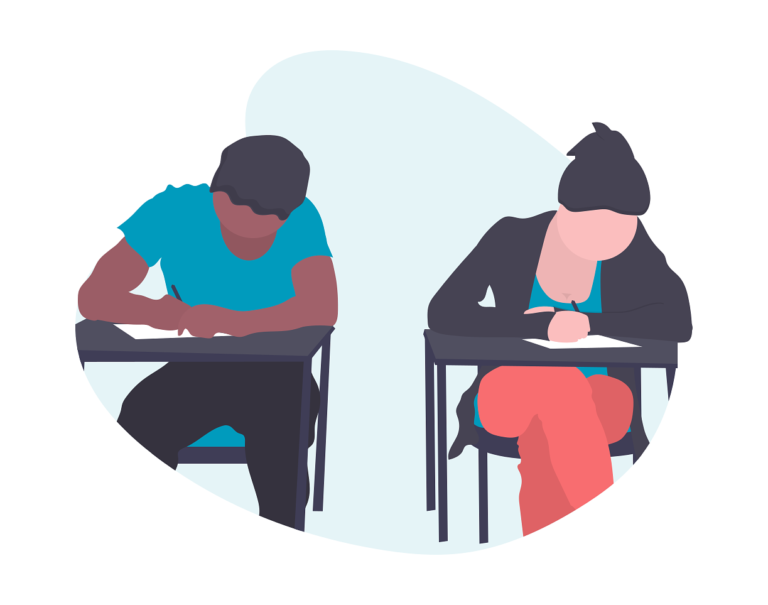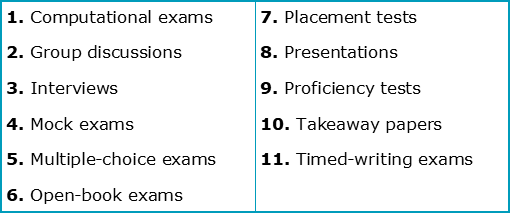Which study skills are useful for English exams?

This is the first of three chapters about Exam Preparation. To complete this reader, read each chapter carefully and then unlock and complete our materials to check your understanding.
– Discuss the four formats of university examinations
– Introduce the eleven common examination types
– Explore the most helpful listening, reading, writing, presentation and study skills during exams
Before you begin reading...
-
video and audio texts
-
knowledge checks and quizzes
-
skills practices, tasks and assignments
Chapter 1
Almost all high school and university students will have to become familiar with examinations during their education. While stressful, such high-pressure assessments are unfortunately a necessary aspect of academic study. This is especially true nowadays when paying for essays online is becoming increasingly common and when student ability must be tested on-the-spot.
While examinations are certainly challenging, the amount of stress that students experience can be greatly reduced provided they prepare adequately. This short reader on exam preparation has therefore been designed to explore the study skills (Chapter 1), materials (Chapter 2) and common tips (Chapter 3) that make for successful examination results.

What are the key formats and types of examination?
While the type of examination a university, subject or course tutor requires may vary from institution to institution, there are in truth only a limited number of possible exam formats that students will have to prepare for. These are less-formal in-class exams, formal invigilated exams, online exams completed on or off campus using computers, and takeaway exams completed at home under timed conditions. Among these four formats are eleven commonly used examination types:


Are listening skills helpful?
Different skills will be required for different exam types. For those exams that use video or audio recordings or live conversations for example, listening skills will be very important for students. When completing group discussions, interviews, or presentations, a student would have to use strategies of gist, specific and detail listening and may need to be familiar and confident with both the speed of the conversation and any variation caused by accent or dialect.
What about reading skills?
Similarly, for multiple-choice exams, placement tests, proficiency tests and timed-writing exams, a student’s ability to read quickly and accurately will also be tested. For these types of examination, it may therefore be a good idea to practice reading strategies such as skimming, scanning and intensive reading, as well as improve reading speed and how to deal with new vocabulary.
Which writing skills help in exams?
Any exam that involves reading skills generally also requires writing – and timed essays are a particular favourite of universities. To succeed in these types of examinations, students may therefore wish to improve their concision, their ability to precisely define and categorise, edit and proofread, and their ability to clearly hypothesise trends and describe data.



What about presentation skills?
Some examination types such as group discussions and presentations may also require a number of presentation skills. This may include elements of body language such as gestures and postures, elements of delivery such as voice and pronunciation, and the memorisation and inclusion of appropriate presentation language. When using software such PowerPoint, students should also have a good knowledge of how to appropriately use visual aids.
Are there any other useful study skills?
In addition to the key skills of listening, speaking, reading and writing, there are more general study skills that students should try to master before their final examinations. These include research skills such as the use of dictionaries, critical thinking and notetaking skills, planning and drafting, and plagiarism avoidance through sufficient paraphrasing and summarising. If a student is weak in any one of these areas, their ability to complete an examination and therefore their final grades may be significantly affected.
Good work on completing this first lesson about exam preparation. Before moving on to Chapter 2 about examination materials, try completing our Chapter 1 activities to check progress and understanding.
To reference this reader:
Academic Marker (2022) Exam Preparation. Available at: https://academicmarker.com/academic-guidance/examinations/exam-preparation/ (Accessed: Date Month Year).
Downloadables
Once you’ve completed all three chapters in this short reader about Exam Preparation, you might then wish to download our Chapter Worksheets to check your progress or print for your students. These professional PDF worksheets can be easily accessed for only a few Academic Marks.
Chapter 1 explores the topic: Which study skills are useful for English exams? Our Chapter 1 Worksheet (containing guidance, activities and answer keys) can be accessed here at the click of a button.
Chapter 2 explores the topic: Which materials can I take into academic exams? Our Chapter 2 Worksheet (containing guidance, activities and answer keys) can be accessed here at the click of a button.
Chapter 3 explores the topic: How should I prepare mind and body for exams? Our Chapter 3 Worksheet (containing guidance, activities and answer keys) can be accessed here at the click of a button.
To save yourself 2 Marks, click on the button below to gain unlimited access to all of our Exam Preparation Chapter Worksheets. This All-in-1 Pack includes every chapter, activity and answer key related to this topic in one handy and professional PDF.
Collect Academic Marks
-
100 Marks for joining
-
25 Marks for daily e-learning
-
100-200 for feedback/testimonials
-
100-500 for referring your colleages/friends